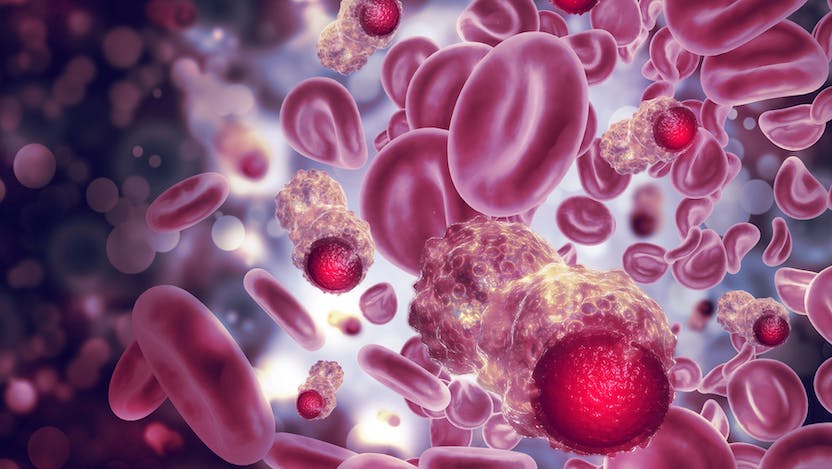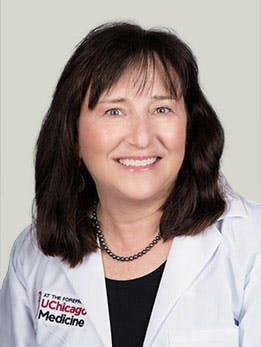Comprehensive care improves outcomes in adult lymphoblastic leukemia

Various biological and socioeconomic factors can affect treatment outcomes for adults with acute lymphoblastic leukemia (ALL), a rare form of blood cancer. However, a new study shows that patients achieve the best outcomes and survival rates when they receive treatment at a dedicated center with expertise in treating ALL.
Most cases of ALL occur in children, and about 90% of ALL cases in children are curable. Adults make up less than half of ALL cases but have a greater risk of death due to the adverse (poor) molecular characteristics of their disease and overall frailty.
Along with his team, Caner Saygin, MD, Assistant Professor of Medicine at the University of Chicago Medicine Comprehensive Cancer Center, examined the contribution of biological, social and economic factors on outcomes among adult patients with ALL. They compared data from patients treated at UChicago Medicine with a national database of cancer cases collected by the Surveillance, Epidemiology, and End Results (SEER) Program.
Their findings, reported on December 1, 2023 in Blood Advances, suggest that improved access to multidisciplinary medical care, coupled with essential supportive care services offered at centers experienced in ALL care, may alleviate socioeconomic disparities in ALL outcomes in the United States.
Age and biological factors impact outcomes
Older age at diagnosis was a key predictor of poor overall survival in both the UChicago Medicine and SEER cohorts. However, adults over the age of 40 treated at UChicago Medicine had a higher likelihood of survival than the national average over the same period.
Treatment for ALL differs between older adults and those under 40 years of age, collectively labeled adolescents and young adults (AYA). Aggressive, pediatric-like treatment regimens pioneered by Wendy Stock, MD, Anjuli Seth Nayak Professor of Medicine at the University of Chicago, have shown promise for the treatment of ALL in AYA patients.
Yet strategies for older adults remain a challenge. “Older adults need more advanced care and clinical trials," Saygin said.
Higher body mass index (BMI) at diagnosis was also associated with worse outcomes. Saygin hypothesized this may be due to biological factors contributing to the cancer itself. “It might have something to do with how drugs are dosed or metabolized, or how fatty tissue affects tumor biology,” he said.
Another biological factor contributing to outcomes was the presence of a specific genetic abnormality. BCR::ABL1 is also called the Philadelphia chromosome. This mutation was found at higher prevalence in patients with higher BMI and in patients with non-Hispanic Black ancestry, who made up 15% of ALL patients treated at UChicago Medicine.
Philadelphia-positive cancers, Ph+ B-ALL, were previously considered more aggressive and difficult to treat than other types of ALL. With the approval of new drugs called tyrosine kinase inhibitors (TKIs) to target these cancers, Ph+ B-ALL is now associated with better outcomes. However, inequalities in patient access mean this improvement is not seen uniformly across the US.
“TKIs are expensive, and if health systems don’t have teams to find grants or coverage, their patients may not have access to these drugs,” Saygin said. “That’s another disparity.”
Access to comprehensive care reduces disparities
“ALL disproportionately affects underrepresented minorities,” Saygin explained.
Nationally, socioeconomic factors such as low income and Black or Hispanic race and ethnicity showed a negative impact on overall survival.
However, patients treated at UChicago Medicine did not show differences in outcomes based on race or income. Nationally, low-income adult ALL patients have a median survival of 32 months. In the UChicago cohort, the 8% of patients who were low-income had a median survival of 84 months — more than double the national average.
“Our patients have access to leading-edge clinical trials and supportive care from multidisciplinary teams,” said Saygin. He emphasized the importance of comprehensive treatment in reducing disparities, arguing that these resources contribute to improved survival in all patient groups.
He said UChicago Medicine, dedicated to health equity, works diligently to ensure all patients have access to the most effective treatments.
“Both the AYA clinic and the older adult program are enriched with good support in terms of social workers, case managers and pharmacist support to adjust these complicated ALL regimens,” he said.
In addition to Saygin and Stock, authors included Hannah Johnston, Hamed Rahmani Youshanlouei, Clinton Osei, Anand A. Patel, Adam S. DuVall, Peng Wang, Pankhuri Wanjari, Jeremy P. Segal, Girish Venkataraman, Jason Xiaojun Cheng, Sandeep Gurbuxani, Angela M. Lager, Carrie Fitzpatrick, Michael J. Thirman, Mariam T. Nawas, Hongtao Liu, Michael W. Drazer, Olatoyosi Odenike, and Richard A. Larson.
All authors are affiliated with the University of Chicago Pritzker School of Medicine. This work was funded by the Leukemia Lymphoma Society Special Fellow Award, Prevent Cancer Foundation Fellowship, Cancer Research Foundation, and Elsa Pardee Foundation grants.

Wendy Stock, MD
Wendy Stock, MD, focuses on treatment for patients with acute and chronic leukemias, myelodysplastic syndromes and myeloproliferative neoplasms, including hematopoietic cell therapies.
Learn more about Dr. Stock